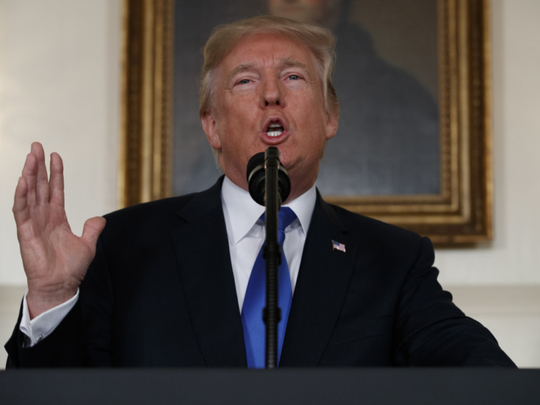
US President Donald Trump has never been shy about his displeasure with the Iranian nuclear deal. It was a favourite punching bag of his throughout the election campaign, proof that the US has “terrible negotiators” — and its status as former president Barack Obama’s signature foreign policy victory certainly didn’t help. It is therefore no surprise that he has now announced his intention to decertify the deal, signed in 2015 to limit Iran’s nuclear programme in exchange for a reduction in sanctions. Yet this is not “Trump going rogue”, and it would be unwise to dismiss this move as another example of madness.
For Trump’s discomfort with the Iran deal is widely shared throughout the Republican Party, across the aisle with certain Democrats (including Chuck Schumer, the Senate minority leader), and throughout the US. Its critics feel that Obama gave away too much for too little — removal of economic sanctions in exchange for freezing the Iranian nuclear programme for a limited period was, and is, disproportionate. Fifteen years in the course of history is virtually nothing, and we have not dismantled Iran’s ability to produce a nuclear weapon so much as delayed it.
Throughout the negotiation process, and especially during the final push to get the agreement past Congress, a sense lingered that Obama was looking for the sort of signature victory which makes for an excellent exhibit in a presidential library (as well as a way to finally earn that Nobel Peace Prize). As with his decision to resume diplomatic relations with Cuba, or the disastrous “reset” with Russia, one got the rather distinct impression that he was putting his place in the history books before the reality of America’s foreign policy interests.
Americans do not see the Iranian regime as a partner in peace, nor do we trust that this deal is sufficient to stop Iran’s nuclear ambitions. We have not forgotten the 241 US Marines killed in the Beirut bombings in 1983, nor the 224 people killed at our embassies in Dar es Salaam and Nairobi in 1998 — attacks for which the Iranian government was held liable in US civil courts. We have not forgotten our moniker of “the Great Satan”. And we have not forgotten that it is fundamentally in Iran’s interest to propagate violence in the various civil conflicts which beset the Middle East. This regime is not an ally of the US, and this deal was never going to change that.
Unfortunately, none of this alters the fact that, at this point, it would be imprudent to pull out of the agreement altogether. Doing so would ensure that in foreign policy circles, nothing that this administration does will be taken on faith, and it will all be put under a magnifying glass. Demonstrating that a major diplomatic accord signed by one president might be undone by the next does not invite trust — and we are probably not so far away from sitting down with another non-ally to negotiate deferment of a nuclear apocalypse. It would also play into the dangerous narrative that the US is inching off the world stage, one isolationist decision at a time. The good news here is that the president isn’t actually pulling out of the agreement, despite his declaration that this “fanatical regime” is spreading “death, destruction and chaos”. Nothing is being ripped up, canned, or sent to the great shredder in the sky. Instead, Trump has pledged to decertify the agreement, which punts it back to Congress for 60 days to decide whether sanctions should be re-imposed. He has stopped short of scrapping the deal entirely.
Plans are afoot in the Senate, led by Tom Cotton and Bob Corker, to strengthen the deal by automatically re-imposing sanctions if Iran gets within a year of full nuclear capability. This would neuter one of the major criticisms of the existing deal, whose sundown provisions give Iran the ability (and incentive) to build on its existing nuclear programme in the intervening years, so that by the end of the pact, they’ll have a fully functioning nuclear warhead and a strengthened economy.
This would be a positive development. The rest of the world (Britain included) is too concerned with their short-term economic interest to consider the long-term implications of a nuclear-armed Iran; it is clearly up to the US to prevent such an eventuality. In any case, the point of entering into negotiations was not to come out with a piece of paper which could be applauded by the commentariat. It was to stop Iran from getting the Bomb.
— The Telegraph Group Limited, London 2017
Molly Kiniry is a researcher at the Legatum Institute.










